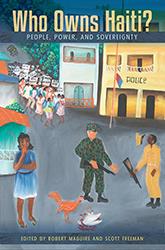In this volume, Elizabeth Manley explains how women activists from across the political spectrum engaged with the state by working within both authoritarian regimes and inter-American networks, founding modern Dominican feminism, and contributing to the rise of twentieth-century women’s liberation movements in the Global South.
Browse by Subject: Latin American Studies
Please note that while you may order forthcoming books at any time, they will not be available for shipment until shortly before publication date
Gathering oral stories and visual art from Haiti and two of its "motherlands" in Africa, Istwa across the Water recovers the submerged histories of the island through methods drawn from its deep spiritual and cultural traditions.
This anthology brings together more than sixty primary texts to offer an ambitious introduction to Spanish American thought and culture. Myths, poetry, memoirs, manifestos, and fiction are translated from Spanish to English, some for the first time.
Who Owns Haiti? explores the role of international actors in the country's sovereign affairs while highlighting the ways in which Haitians continually enact their own independence on economic, political, and cultural levels.
This incredible cookbook, filled with hundreds of recipes that were used by people of all nationalities during the American Era, represents the merging of all those cultures. It aims to preserve the unique cultural and historical heritage of those dedicated men and women who labored to make the Canal truly one of the World’s greatest accomplishments.
Sinan Koont has spent the last several years researching urban agriculture in Cuba, including field work at many sustainable farms on the island. He tells the story of why and how Cuba was able to turn to urban food production on a large scale with minimal use of chemicals, petroleum, and machinery, and of the successes it achieved--along with the continuing difficulties it still faces in reducing its need for food imports.
Between the mid-nineteenth and mid-twentieth centuries, an influx of Europeans, Asians, and Arabic speakers indelibly changed the face of Latin America. While many studies of this period focus on why the immigrants came to the region, this volume addresses how the newcomers helped construct national identities in the Caribbean, Mexico, Argentina, and Brazil.











